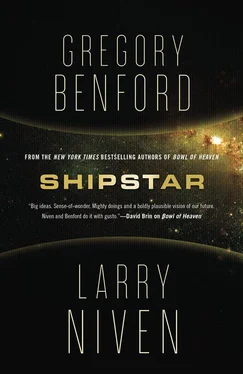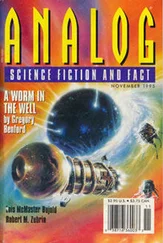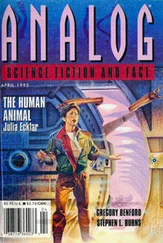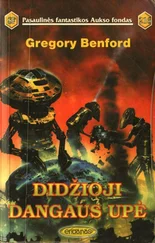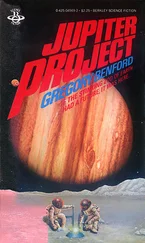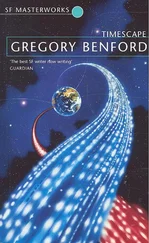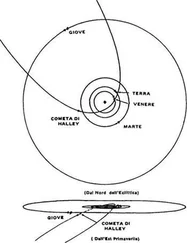Gregory Benford - Shipstar
Здесь есть возможность читать онлайн «Gregory Benford - Shipstar» весь текст электронной книги совершенно бесплатно (целиком полную версию без сокращений). В некоторых случаях можно слушать аудио, скачать через торрент в формате fb2 и присутствует краткое содержание. Год выпуска: 2014, ISBN: 2014, Издательство: Tom Doherty Associates, Жанр: Космическая фантастика, на английском языке. Описание произведения, (предисловие) а так же отзывы посетителей доступны на портале библиотеки ЛибКат.
- Название:Shipstar
- Автор:
- Издательство:Tom Doherty Associates
- Жанр:
- Год:2014
- ISBN:978-1-4299-4968-2
- Рейтинг книги:4 / 5. Голосов: 1
-
Избранное:Добавить в избранное
- Отзывы:
-
Ваша оценка:
- 80
- 1
- 2
- 3
- 4
- 5
Shipstar: краткое содержание, описание и аннотация
Предлагаем к чтению аннотацию, описание, краткое содержание или предисловие (зависит от того, что написал сам автор книги «Shipstar»). Если вы не нашли необходимую информацию о книге — напишите в комментариях, мы постараемся отыскать её.
Shipstar — читать онлайн бесплатно полную книгу (весь текст) целиком
Ниже представлен текст книги, разбитый по страницам. Система сохранения места последней прочитанной страницы, позволяет с удобством читать онлайн бесплатно книгу «Shipstar», без необходимости каждый раз заново искать на чём Вы остановились. Поставьте закладку, и сможете в любой момент перейти на страницу, на которой закончили чтение.
Интервал:
Закладка:
Tananareve was sweating and her arms ached. She couldn’t match the jumping style of her companions in 18 percent gravity without a painful clicking in her hip and ribs. Her pace was a gliding run, sometimes bounding off an obstructing wall, sometimes taking it on her butt—all assisted by her hands. It demanded a kind of slithering grace she lacked.
Beth, Lau Pin, Mayra, and Fred were ahead of her. She paused, clinging to a buttress shaft. She needed rest, time, but there was none of that here. For a moment she let the whole world slide away and just relaxed, as well as she could. These moments came seldom but she longed for them. She sighed and … let go.…
Earth came to her then … the quiet leafy air of her childhood, in evergreen forests where she hiked with her mother and father, her careless laughter sinking into the vastness of the lofty trees. Her heart was still back there in the rich loam of deep forests, fragrant and solemn in the cathedral redwoods and spruce. Even in recalling it all, she knew it had vanished on the tides of time. Her parents were dead for centuries now, surely, despite the longevity treatments. But the memories swarmed up into her as she relaxed for just a long, lingering moment.
Her moment of peace drained away. She had to get back to running.
In the dim light, she could barely make out the finger snakes flickering ahead of the long-striding humans. They had an amazingly quick wriggle. Probably they’d been adapted through evolution to do repairs in the Bowl’s understory. Beth had gotten fragments of their history out of the snakes, but the translation was shaky. They’d been here on the Bowl so long, their own origins were legends about a strange, mythical place where a round white sun could set to reveal black night.
“Beth,” Tananareve sent over short-range comm, “I’m kinda … I … need a rest.”
“We all do,” came the crisp reply. Beth turned up ahead and looked back at her, too far away to read an expression. “Next break is five minutes.”
“Here I come.” She clamped down her jaw and took a ragged breath.
Their target was an automated cargo drone. The snakes had told of these, and now the bulkheads and struts they passed were pitched forward, suggested they were getting close. Up ahead, as she labored on, she could see it emerge, one in a line of identical flat-bellied cylinders. Tananareve could see the outline of a great oyster-colored curved hatch in its side, and— was that? Yes! —stars beyond a window wall. She felt elation slice through her fatigue. But now the hip injury had slowed her to a limping walk.
Without the finger snakes, this plan would have been impossible.
She limped up to the rest of them, her mouth already puckering at the imagined taste of water. The three snakes were decorated in camouflage colors, browns and mottled blacks, the patterns almost the same, but Tananareve had learned to tell them apart. They massed a bit more than any of the humans, and looked like snakes whose tails had split into four arms, each tipped with a claw. Meaty things, muscular, slick-skinned. They wore long cloth tubes as backpacks, anchored on their ridged hides.
Beth’s team had first seen finger snakes while escaping from the garden of their imprisonment. Tananareve surprised a nest of them and they fled down into deep jungle, carrying some cargo in a sling. The snakes were a passing oddity, apparently intelligent to a degree. Her photos of them were intriguing.
Now it was clear the finger snakes must have tracked and observed their party ever since. When Fred led the humans to an alien computer facility, they were not in evidence. Fred had found a way to make the computer teach them the Bird Folk language. Among his many talents, Fred was a language speed-learner. He got the quasilinear logic and syntax down in less than a day. Once he had built a vocabulary, his learning rate increased. A few more days and he was fluent. The whole team carried sleep-learning, so they used a slip-transfer from Fred’s. By then he had been somehow practicing by himself, so it was best that he got to talk to the snakes first.
They just showed up, no diplomacy or signposting. Typical snake character—do, don’t retreat into symbols or talk. When the finger snakes crawled through the door, somehow defeating Lau Pin’s lock, Fred said hello and no more. He wasn’t exactly talkative either—except, as he often rejoined, when he actually had something important to say.
So after his hello, and a spurt of Snake in reply, Tananareve was able to yell at them. “Give you honor! We are lost!”
Five snakes formed a hoop, which turned out to be a sign of “fruitful endeavor commencing.” Tananareve made a hand-gesture she had somehow gotten from the slip-transfer. This provoked another symbol, plus talk. Formal snake protocol moved from gestures and signs into the denser thicket of language. Luckily, the highest form of Snakespeech was a modified Bird Folk structure that stressed lean and of sinew as virtues, so their knotted phrases did convey meaning in transparent, staccato rhythms.
The finger snakes were rebels or something like it, as nearly as Tananareve could untangle from the cross-associations that slithered through Snakespeech. Curious, also. Humans were obviously new to their world, and therefore they began tracking the human band in an orderly, quiet way shaped by tradition. The snakes worked for others, but retained a fierce independence. Knowledge was their strong suit—plus the ability to use tools of adroit shape and use. They went everywhere in the Bowl, they said, on engineering jobs. Especially they maintained the meters-thick layers between the lifezone and the hard hull. In a sense, they maintained the boundary that separated the uncountable living billions from the killing vacuum that waited a short distance away.
The snakes wanted to know everything they could not discover by their intricate tracking and watching. They knew the basic primate architecture, for their tapering “arms” used a cantilevered frame that bore a warped resemblance to the human shoulder. This, plus a million more matters, flew through their darting conversations. Snakes thought oddly. Culture, biology, singing, and food all seemed bound up in a big ball of context hard to unravel. But when something important struck them, they acted while humans were still talking.
When it was clear that humans would die if they stayed at low gravity for too long, the finger snakes led them here: to a garage for magnetically driven space vehicles. Snake teams did the repairs here.
One of the finger snakes—Thisther, she thought—clicked open a recessed panel in the drone, so the ceramic cowling eased down. Thisther set to work, curling head to tail so his eyes could watch his nail-tipped fingers work. The wiry body flexed like cable. Phoshtha turned away from him, on guard.
Tananareve was still guessing at genders, but there were behavior cues. The male always seemed to have a tool in hand, and the females were wary in new surroundings. Thisther was male; Phoshtha and Shtirk were female.
Phoshtha’s head dipped and curled as she turned around, seeking danger. Shtirk wasn’t visible; she must be on guard. Tananareve sensed no obvious threats, barring, perhaps, a whistling just at the edge of her hearing.
Phoshtha wriggled to meet her. “Thisther knows computers-speak,” she said. “King of computers = persons. Will write thrust program for us quick, person-comp-adept, she is. Are you sick?”
“Was injured,” Tananareve said. “Not sick. Am healing.” Both spoke in Bird talk, its trills and rolled vowels chiming like a song.
“Is well we know.”
The curved side of the cargo drone slid up with a high metallic whine. Green verdant wealth. The drone was filled, jammed with vegetation—live plants standing forth in trays, rich hanging streamers. Lights in the curved ceiling glared like suns. Thisther continued to work, and suddenly trays were sliding out and falling. Half the trays had piled up on the deck when it stopped.
Читать дальшеИнтервал:
Закладка:
Похожие книги на «Shipstar»
Представляем Вашему вниманию похожие книги на «Shipstar» списком для выбора. Мы отобрали схожую по названию и смыслу литературу в надежде предоставить читателям больше вариантов отыскать новые, интересные, ещё непрочитанные произведения.
Обсуждение, отзывы о книге «Shipstar» и просто собственные мнения читателей. Оставьте ваши комментарии, напишите, что Вы думаете о произведении, его смысле или главных героях. Укажите что конкретно понравилось, а что нет, и почему Вы так считаете.
